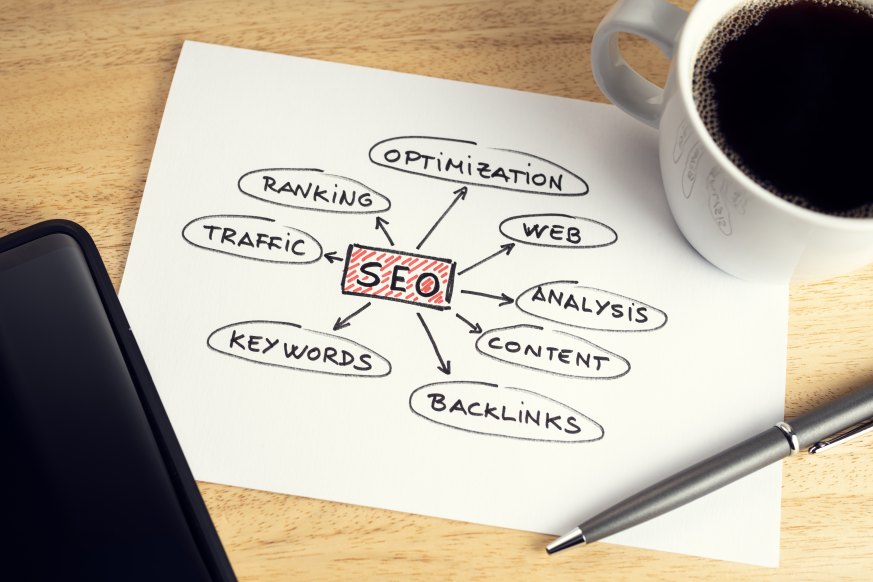Are you looking to increase your website’s visibility within the search engine results pages (SERPs)? A comprehensive enterprise SEO and audit process should be on your list. An effective SEO audit takes time and dedication as it involves reviewing all facets of a site’s structure, content, keywords, and other elements that influence an online presence.
Before beginning any SEO strategy or plan for improvement, businesses need to take stock of their online landscape by performing a thorough enterprise SEO audit. This blog post will review the eight essential elements to consider when conducting an in-depth Enterprise-level SEO auditing process. Learn how to apply these steps to create an effective optimization journey for your business website!
What is an Enterprise SEO Audit?
An enterprise SEO audit is a comprehensive review of a company’s website and digital presence to identify areas that need improvement or optimization for improved organic search rankings. This type of audit aims to identify areas where improvements can be made so that the company’s digital assets can reach their fullest potential.
An enterprise SEO audit will uncover any problem areas hindering search engine optimization efforts by examining a website’s design, coding, content, and performance. The audit will also review internal linking structures, backlink profiles, and keyword usage to identify any missed opportunities that could be further optimized. Once an audit is complete, the organization can use the findings to create an actionable improvement plan.
Why Should You Conduct an Enterprise SEO Audit?
An enterprise SEO audit is essential to any successful digital marketing strategy. It provides a comprehensive assessment of your website regarding its visibility, rankings, and content structure. An audit can help uncover weaknesses and opportunities for improvement and enable you to make data-driven decisions about improving your overall performance.
Let’s know the benefits of an enterprise SEO audit in detail.
Improved Content Structure
An SEO audit can provide an overview of how well-structured and organized your content is, helping to identify any areas of improvement that need addressing. This includes ensuring all URLs are descriptive, identifying pages with thin content, and assessing the overall layout of your website.
By improving the structure and organization of your content, you can create a more user-friendly experience for visitors, helping to increase engagement levels and reducing bounce rates. Additionally, ensuring all pages are properly optimized will help ensure that search engines can accurately crawl each page on your website.
Higher Rankings
Once your website has improved visibility, the next step is improving your rankings. An SEO audit can help identify any technical issues preventing you from achieving the highest rankings in search engine results. This could include identifying duplicate content, optimizing page titles and meta descriptions, or fixing broken links. In addition, the audit can help you identify opportunities to focus on keywords related to your product or service that may be easier to rank for. By focusing on the right keywords, you can drive more qualified traffic and leads to build your business.
Are you looking to boost your website’s visibility and drive more traffic to your enterprise business?
Contact Growth Hackers
Increased Visibility
An effective audit will help identify any problems with your website that could prevent it from appearing in search engine results. This can include errors such as crawlability issues, or poor page speed performance. By addressing these problems, you can increase the visibility of your pages in search engine results.
Optimizing your content for targeted keywords can help improve your website’s accuracy and relevance in search results. Suppose you have a page dedicated to running shoes; an SEO audit can help identify any potential keyword optimization opportunities on this page that could help it appear in search results for queries related to running shoes.
Increased Conversion Rates
When it comes to digital marketing, driving more traffic and leads through organic search results is great – but it’s not the only goal. Ultimately, you want to convert those visitors into paying customers. An enterprise SEO audit can help optimize your website for conversions by identifying any existing obstacles preventing visitors from converting.
For example, if you have a page that is not mobile-friendly, this could discourage prospects from completing the purchase process. By making your content more accessible across all devices, you can increase conversion rates and maximize your return on investment.
Increased Performance
Finally, an SEO audit can reveal potential areas of improvement when optimizing your website’s performance. This includes identifying any slow-loading pages that could impact visitor experience or uncovering opportunities to reduce server response times to improve page speed performance.
Ensuring all images are optimized for size and quality can also help improve overall performance. By making these improvements, you can ensure visitors have the best experience browsing your pages, helping improve overall engagement levels and CTRs.
Overall, an enterprise SEO audit provides tremendous value in identifying areas for improvement and helping you make data-driven decisions about optimizing your website. Through a comprehensive audit, you can ensure that your website performs to its fullest potential regarding visibility, rankings, and performance.
The 8 Key Elements of a Foolproof Enterprise SEO Audit
Enterprise SEO audits are essential for businesses today, as they help to identify how well a website is optimized for search engines and user experience. The eight key elements of a foolproof enterprise SEO audit will ensure that all necessary components are considered when evaluating the effectiveness of a website.
Let’s examine the eight key elements of a foolproof enterprise SEO audit.
1. Traffic Analysis
Traffic analysis examines how visitors interact with a website, and it’s an important part of any SEO audit. Traffic analysis helps identify potential issues regarding user experience, such as major drop-off points on specific pages or overall website navigation difficulties.
Additionally, traffic analysis can help pinpoint when organic and search engine traffic began increasing or decreasing to determine whether any changes in search engine rankings affected overall website traffic. Suppose the website traffic has drastically decreased after an SEO change; this indicates that some changes must be made to improve the overall user experience.
2. Keyword Research
Keyword research is another critical component of any enterprise SEO audit, as it helps to identify which keywords are important for your website to target. By looking at current search trends and analyzing the competition for target keywords, you can pinpoint which words and phrases have a high search volume and low difficulty rating. This can help inform your enterprise SEO strategy by giving you an idea of which terms will likely be successful for your website.
Furthermore, it is important to consider keyword intent when researching keywords. Not all keywords will be relevant to your specific business objectives, so make sure you are targeting queries that people use in their searching process that relate directly to what your website offers.
Additionally, consider the variations of each keyword phrase – singular and plural forms—and other words with similar meanings or connotations that could be used in place of a particular keyword phrase.
Once you have identified the most promising keywords, use them to create search engine-friendly content that is well-constructed and optimized for SEO. This could include incorporating the selected keyword phrases into product descriptions and blog post titles and using them in meta tags and page headings. By leveraging these keywords effectively, you can ensure your website has a higher chance of ranking for relevant queries.
It’s time to book your enterprise SEO audit today and start climbing the search engine rankings!
3. Page and Site Structures
Your website’s page and structure are also essential for SEO success, as it helps ensure that search engine bots can easily crawl through your content. This includes assessing the navigation elements on each page, such as menus, sidebars, footers, and links to other pages within the domain.
Additionally, consider if there are any orphaned pages – i.e., pages without any links leading to them from any other part of the website – that may be preventing efficient crawling by search engine bots.
Moreover, optimizing the URL structure of a website is key for both users and search engines. URLs should be descriptive so that users know what to expect when clicking on them; they should also be concise and use relevant keywords. A well-structured URL is more likely to appear in search engine results, so ensure each page has a unique and descriptive URL that is easy for users and bots to decipher.
4. Internal Linking
Internal linking is also an important aspect of enterprise SEO audit, as it helps establish a website’s hierarchy and structure. By creating clear links between related pages on your domain, you can help search engines understand and engine bots to navigate easily through your website’s content.
This makes it easier for them to understand each page and how it relates to other parts of the website. Furthermore, internal links also provide users with additional information that may be relevant to their queries; this allows them to delve further into your website and explore more content.
Ensure that all internal links point to valid URLs and include descriptive anchor text for users and bots alike. Be mindful not to overuse keyword-rich anchor text, as this can lead to a penalty from search engines. Additionally, keep track of all links on your website and regularly check for any broken or outdated ones. This helps to maintain good website hygiene, which is essential for SEO success.
5. Social Media
Social media is an integral part of any enterprise SEO audit. It should not be overlooked as a platform with immense potential for driving traffic and generating leads. Firstly, look at which social channels your target audience is most active on and focus on creating content for those channels. Ensure that each post contains relevant keywords for better discoverability, and also include links back to your website to encourage users to explore more of your content.
Another effective way to use social media is by engaging with industry influencers. Reach out to these professionals and build relationships with them; this may result in opportunities such as guest posting or a potential partnership. Additionally, keep track of customer feedback from different social channels and promptly address any issues to ensure a positive user experience. This can help you maintain a good online reputation while improving SEO rankings.
6. Mobile Optimization
Mobile optimization is critical for any enterprise SEO audit. With more and more people accessing the internet from their mobile devices, your website must also be optimized for them. This includes ensuring that all content is responsive and looks great no matter what device users are on. Additionally, use Google’s Mobile-Friendly Test tool to identify potential issues with how your website appears on different devices.
Other mobile optimizations include:
- Eliminating intrusive pop-ups.
- Reducing page loading times.
- Ensuring all content is easily scrollable without zooming in and out.
These factors can greatly impact user experience, affecting your rankings on search engine results pages. As such, paying attention to mobile optimization is important when conducting an enterprise SEO audit. The search engine crawlers are doing the same, and you must ensure that your website meets its standards.
7. Structured Data
Structured data markup, or schema markup, is a great way to improve your website’s visibility in SERPs. Adding this code to certain website elements can help search engines better understand what they see and provide richer snippets that stand out from other organic results. This includes adding star ratings for reviews or providing additional information about your products and services. In the google search console, you can also track structured data errors.
Besides quickly helping users find the information they’re looking for, structured data markup can positively impact click-through rates. Moreover, this technical marketing tactic is an important part of voice search optimization, allowing users to receive more accurate results when using voice commands. Therefore, conducting an enterprise SEO audit should include a review of your structured data markup and identifying any areas for improvement.
8. Competitor Analysis
Finally, a comprehensive enterprise SEO audit should include a thorough competitor analysis. Considering competitors’ actions can help you identify potential opportunities you may have overlooked during the initial phases of your website launch or recent updates. Look at which keywords they’re targeting and analyze their link-building strategies to gain insight into how they are improving their visibility and rankings on SERPs.
You can also use tools like SEMrush to compare your enterprise website performance with your competitors. This can help you better understand how they achieve their results and what tactics you may need to adopt to improve yours. In addition, keep an eye on industry trends, as this will help you stay ahead of the competition and ensure that your enterprise SEO audit is up-to-date.
As the enterprise SEO audit cost can be expensive, these eight key elements should guide any company looking to improve its visibility and rankings on SERPs. Focusing on these elements in your SEO audit checklist can ensure a comprehensive assessment of your website and its SEO performance.
Final Words on Enterprise SEO Audits
Enterprise SEO audits are essential for any organization looking to ensure the success of its website in highly competitive markets. By considering the eight key elements outlined above, marketers can take a comprehensive approach to auditing their enterprise websites and develop an actionable plan for long-term improvement. It’s important to remember that SEO is not a one-time task – it requires continuous effort and attention to ensure success. As an enterprise SEO audit report is always helpful for website optimization, regularly audit your site to keep track of its performance and stay ahead of the competition.
With this knowledge, businesses can make well-informed decisions to increase ROI from their SEO efforts. Any SEO agency can help you with your audits, but the eight key elements combined with regular review are necessary for a foolproof enterprise SEO audit. By following these best practices you can set your business up for long-term success in organic search. Happy auditing!
Growth Hackers is an award-winning enterprise SEO agency helping businesses from all over the world grow. There is no fluff with Growth Hackers. We help entrepreneurs and business owners conduct an enterprise SEO audit, increase their productivity, generate qualified leads, optimize their conversion rate, gather and analyze data analytics, acquire and retain users and increase sales. We go further than brand awareness and exposure. We make sure that the strategies we implement move the needle so your business grow, strive and succeed. If you too want your business to reach new heights, contact Growth Hackers todayso we can discuss about your brand and create a custom growth plan for you. You’re just one click away to skyrocket your business.










